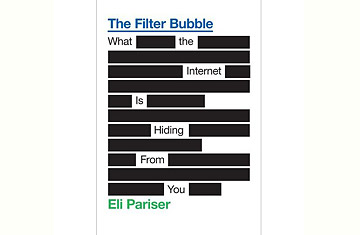
(2 of 2)
It's easy to see why Internet companies are building a personalized Web. After all, the more relevant search results are to you, the more likely you are to click — and more clicks equal more ads and more revenue. Facebook's entire business model is built on personalization, on the idea that our friends (who tend to be like us) can provide us with better information than the world at large can. And what's wrong with that? After all, we've turned to companies like Google and Facebook largely because of their ability to cut through the endless dross of the Web and deliver the one right hit. Schmidt and his peers can argue that they're only giving us what we want — and their sky-high stock prices serve as proof.
Sure, there are some icky privacy issues at play here — after all, to personalize their services, the Internet players need to mine our personal data, and you don't have to be a raging paranoiac to be a little worried about that. But digital privacy isn't exactly what concerns Pariser. What's truly pernicious about the filter bubble is that we don't know what it doesn't show. "Privacy is about what you're willing to reveal about yourself," Pariser told me recently. "But here the question is, What is revealed to you about the world, based on who you are?" Google and Facebook may be tailoring their results to my personality, but I don't know what that's based on — because I don't know what they know about me — so I don't know what I'm missing.
That filter bubble is also a feedback loop. As the Internet delivers results based on our personal preferences, those preferences are reinforced when we click. That can be bad enough for our Netflix recommendations (think of a steady diet of junk comedies), but it's worse for our news consumption. As the news we see via the Internet is tailored to our political preferences, we can end up with what Pariser calls "autopropaganda": an echo chamber for the Web age. If you're progressive, you probably have mostly progressive friends (and even if you have a few conservative friends, Facebook will likely de-emphasize their posts), so you get progressive news and search results. Ditto on the other side of the political aisle. That's bad news for democracy. If you think the country is politically polarized now, imagine what it would be like in a world where everyone gets their news from a personalized Internet that tells them they're always right and the other side is always wrong.
Of course, we already have MSNBC and Fox News, the Huffington Post and Breitbart.com. But as Pariser points out, if you tune in to the liberal or conservative cable stations, you know what side you're picking, and you know they're leaving the other side out. But the filter bubble is invisible: most users think Google and Facebook give them unbiased results, and those companies haven't been eager to set the story straight. It's a result of data asymmetry — the Internet knows everything about us, but we don't know what the Internet is holding back from us.
If we're going to pop the filter bubble, we need to end that asymmetry. It's our data, after all. Internet companies should spell out exactly how they're personalizing their results — and let us opt in or opt out. Until that happens, Pariser suggests, you can pop your own bubble by choosing media from a wide range of viewpoints and cultivating friends from across the political spectrum. The more varied you are, the more difficult it will be for the algorithms to get a lock on you. Beyond that, Pariser argues, "we need a new constituency of digital environmentalists — citizens of this new space we're all building who band together to protect what's great about it."
We don't have much time to waste. If personalization locks in, breaking free will only become tougher. And if that happens, the loss will be more than just political. A personalized Internet is one with the edges sanded off. "It's not just serendipity that's at risk," Pariser writes. "By definition, a world constructed from the familiar is a world in which there is nothing to learn." Escape the filter bubble, and swim freely in the Internet again.
